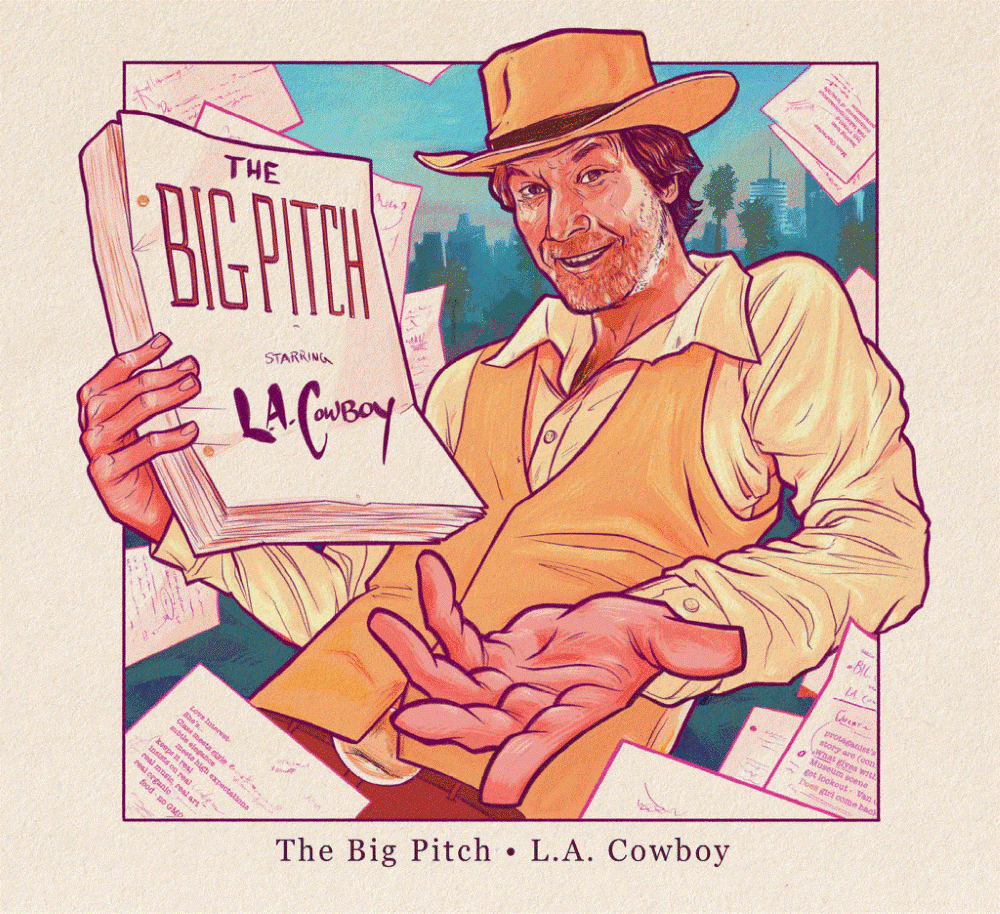A project has crossed our desk with all the mystique, enigma and intrigue of the music industry documentary “Searching for Sugar Man.” To begin with, we highly doubt that most of you have even heard of L.A. Cowboy. We certainly hadn’t — and are openly wondering why.
J. Frederick Millea wrote his first song sitting in a bathtub in the early nineties. Shortly thereafter he took the stage name, L.A. Cowboy, as an homage to the eclectic nature of his work. In the ensuing 9 years he would write a remarkable string of philosophic songs that his artistic associates dubbed “poetry in motion” and “musical mini-movies.” While most current popular songs simply strive to concoct a particular ‘attitude’ seeking to fabricate or manipulate a visceral emotion in the listener, L.A. Cowboy’s convey complete stories, rife with subtle wit, tightly framing profoundly moving thoughts, feelings, and reflections on life, love, loss, resignation and hope.
By 1997 he had produced his first full CD of “invisible art” as he coined it, soon gaining top representation. Offers initially came as a series of boilerplate deals, mostly seeking to “tie up” access and publishing ownership regarding his extensive catalog,
In early 2000, just when it seemed he might acquire a reasonable professional relationship with a major label, the truth finally leaked out: An A&R rep who was highly enthusiastic that he had located the “flagship” artist his major label was lacking was summarily informed by the President of the label that he deemed L.A. Cowboy’s work to be more of a potential problem than a benefit, stating “We sign acts here — not artists.”
When the A&R man protested that another label would swoop him up, the President simply shrugged and revealed “They’re also aware of him, and we’ve all agreed, nobody is going to sign this artist.” The caliber of the material was just something that the label heads did not care to embrace and champion, unanimously concluding that they would have to justify the comparatively lower quality of so many on their rosters.
Devastated and disgusted with the “industry,” L.A. Cowboy sadly walked away. It would take 17 years, some insistent fans and financial backers as well as the maturation of the internet to convince him to make this return, revisiting his previous material to once again present evidence of what the “gatekeepers” in the music industry had purposefully forsaken so many years ago. Understandably, the selected songs showcase an utterly charming, salutary, tongue-in-cheek “ode to Tinseltown.”
As he puts it: “I determined to show the timelessness as well as interpretive ‘reach’ of these rock songs. So I decided to dress some of them up in tuxes on this current outing.”
Initial comments from within the heart of the L.A. creative community are promising:
“Sublime. Dazzling.”
“A refreshing blast of class that at times exhibits sheer splendor.”
“The entire CD is impeccably elegant — permeated throughout with instrumental stretches which are nothing short of electrifying.”
“On the first listen, I thought it was fabulous from front to back. It has grown on me even more as I play it again and again. In a very short time, this CD has become a very old friend. It’s one thing to know about an artist. It’s another to recognize that, mysteriously, he somehow knows about you.”
An extraordinary thing happened when the horn section performed each charted piece. Moved by the charming, refreshingly unique rock horn arrangements, they broke into spontaneous applause after virtually every song as they “tipped their hats’ in recognition towards L.A. Cowboy standing in the control room; something the horn master stated he’d never witnessed in over 30 years of horn recording sessions.
L.A. Cowboy recently mused: “It has been known for decades that the collective audience mentality can either be significantly raised or lowered in conjunction with the calibre of the music and message presented. That doesn’t say much for the integrity, let alone the motives, of the music industry as a whole. Sophistication needn’t be relegated to the upper ranks of elitism. Even the most common classes can appreciate life’s finer refinements and thoroughly enjoy artistic savoir faire, even when unfamiliar with the term itself. All true art is inherently accessible.”
Whether it’s a first class audiophile system, headphones, earbuds or a respectable car stereo we hope you’ll herein find yourself temporarily transported to a world of musical bliss.
From music aficionados with decidedly discriminating taste to the most casual listener — L.A. Cowboy makes music that stimulates the mind as well as the senses. And that is a rare feat indeed.
1. Stories To Tell (3:21)
2. Forget About Her (4:37)
3. Flyover Land (3:59)
4. Angel In L.A. (4:53)
5. The Museum (4:49)
6. The Big Pitch (4:38)
7. Love Songs (3:27)
8. Why Do I? (4:54)
L.A. Cowboy - Vocals
Sam Hirsch - Steinway Piano
Fino Roverato - Guitars
Johnny Hatton - Standup Bass
Claudius Kannbanger - Drums
Jaime Havorka - 1st Trumpet
Ron Brown - 2nd Trumpet
James McMillen - Trombone
George Shelby - Alto Sax
Mike Nelson - Tenor Sax
Terry Landry - Baritone Sax


